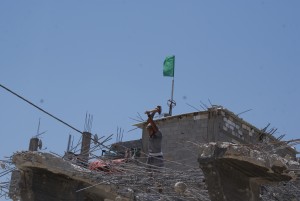9/12: Turning over a new leaf in the Middle East
By Khaled Diab
On the 10th anniversary of the day after 9/11, it is high time to trash the ‘clash of civilisations' theory and the ‘war on terror' and start a new chapter in the West's relationship with the new Middle East.
Monday 12 September 2011
Most people recall vividly where they were on 11 September 2001, when four passenger jets were hijacked and used as highly effective targeted missiles, bringing down the World Trade Centre's ‘twin towers' in New York and damaging the Pentagon in Washington. In all, nearly 3,000 people were killed, making this the most devastating terrorist attack ever on American soil.
Sadly, the massive outpouring of global sympathy, support and solidarity – with people around the world saying “We are all Americans now” – was to prove short-lived, especially in Arab and Muslim countries, as the Bush administration and its neo-conservative allies hijacked this monumental tragedy to serve their own narrow interests.
After apparently taking a break for over a decade, following Francis Fukuyama's confident assertion that history had ended with the collapse of communism in 1989, history re-awoke on 9/12, to an apparently monumental ‘clash of civilisations' – despite the abundant evidence that most clashes are those of interests and that ‘civilisations' more often clash within their civilisational group than outside it – which pitted the enlightened West against the benighted forces of Islam(ism).
Equipped with a brand new enemy to replace the ‘reds under the bed', Washington declared its ‘war on terror' to hunt down those baddie Jihadis and launched a raft of initiatives to civilise the Muslim world.
Providing strong evidence of where the administration's actual priorities lay, hours after the attacks, then Defence Secretary Donald Rumsfeld was already going out of his way to link the atrocity to Iraq, despite the secular nature of Baghdad's Ba'ath regime and the mutual hatred between Saddam Hussein and Osama Bin Laden.
Washington's democratising and civilising mission focused mainly on invading and bombing to smithereens two countries: first Afghanistan (in October 2001) and then Iraq (in March 2003), not to mention the more recent involvement in Pakistan.
Despite at least a quarter of a million deaths and up to $4 trillion in costs to the US tax payer, the decade-old war on terror has resulted in little but death, destruction and destitution, particularly in Iraq which was once one of the most developed and prosperous countries in the Middle East.
The true gains for freedom and democracy in the Middle East have been delivered – as critics of the War on Terror have long been arguing – by the peoples concerned themselves, as demonstrated by the ongoing Arab Spring or Arab Awakening.
In fact, the Arab revolutions undermine many of the assumptions underpinning the US approach over the past decade, even under the Obama administration which took over many of its predecessor's policies, namely that liberty and liberal values could be imposed from outside by a paternalistic West, that freedom is synonymous with free markets, and that democracy and free markets automatically bring greater prosperity and rights to the masses. Another shattered myth is that the United State is a benign power operating for the greater good and not out of the narrow self-interest of its economic and political elite at the expense not only of hundreds of millions around the world but also of ordinary Americans who have been left with a near-bankrupt system, as the recent “default crisis” frighteningly illustrated.
For the Arab revolutionary wave to succeed requires not only that Arabs successfully redefine and reinvent their relationship with those that govern them but also that the relationship between Arab, not to mention other developing, countries with the West and the wealthy industrialised nations.
Although the Arab uprisings are against dictatorship and despotism, they are also against the dictates of Western hegemony and have an economic bottom line. They are part and parcel of a global backlash against growing inequalities triggered by neo-liberal economics and the increasing economic marginalisation of the young.
Tackling this not only requires deep domestic economic reform by Arab regimes but also the reinvention and reconfiguration of the global economic order – which is currently skewed towards the interests of he West, other OECD countries and, increasingly, the emerging might of China and a few other heavy hitters in the developing world – to make it fairer and more equitable.
If the second decade following the 9/11 attacks is to be a brighter one, then Washington and its Western allies need to abandon their paternalistic approach to the Middle East, see the region as more than the sum of its oil wells and allow its people to gain their fair share of the global economic pie.
But with a major energy crisis on the horizon and with Western economies on the verge of bankruptcy, not to mention massive global and regional overpopulation, there are troubling signs that the wrong lessons will be drawn from the first post-9/11 decade. But here's to hoping that enlightened self-interest will win out over destructive selfishness.


